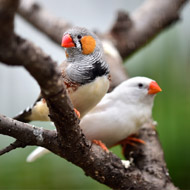Birds see colour in a similar way to humans, study suggests

Zebra finches separate red and orange shades into two separate categories, much like humans do.
A study by US researchers has revealed that birds may see colour in a similar way to humans.
Researchers from Duke University devised an experiment in which they tested the ability of zebra finches to distinguish between different colours.
The study, published in Nature, found that zebra finches separate red and orange shades into two separate categories, much like humans do.
Previous research found that zebra finch females prefer red-beaked males to orange ones. The reason being that redness is associated with good health.
Although this study did not test if birds preferred some shades over others, it is hoped the findings may reveal information about what might happen when a female gazes at a potential mate.
In the study, researchers used combinations of eight shades representing the colour of male zebra finch beaks. They showed 26 female zebra finches a set of paper discs, some two-toned and others solid coloured.
The birds learned that by turning over a two-toned disc, they would be rewarded with a treat. If they turned over a solid disc, they wouldn’t receive anything. If a bird picked a particular disc first, it was a sign that it recognised it as having two colours instead of one.
The experiment involved lots of different colour pairs, but researchers found that females had no trouble identifying colour pairs that were far apart on the colour spectrum (E.g. very red or very orange). When the birds had to choose between various shades in between, however, their reaction was not so clear.
Researchers note the ability to lump all shades on one side of a certain redness threshold may indicate that, when it comes to beak colour, females may not be picky about whether a potential mate is perfect.
“What we’re showing is: he’s either red enough or not,” said senior author and Duke biology professor Stephen Nowicki.
It is not yet understood if the threshold between what humans perceive as “orange” versus “red” is the same for birds. However, researchers say the finding lends support to the idea that colour labels are rooted in biology, and are not shaped by human culture or language.



 The latest
The latest